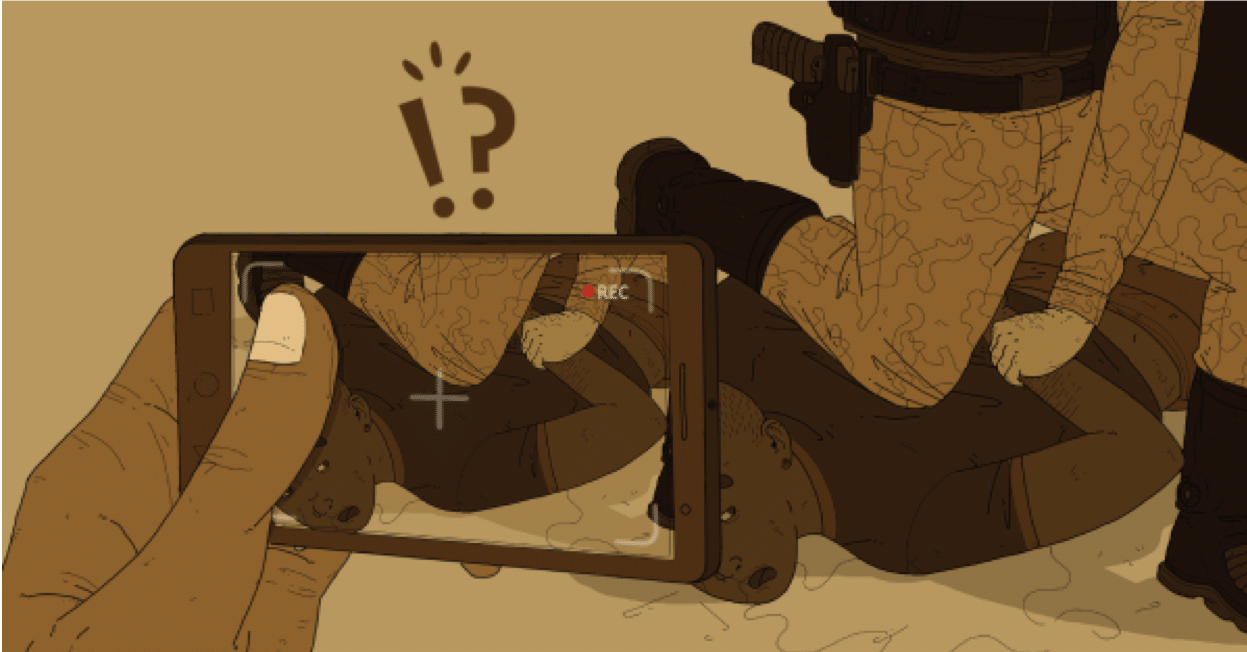
This blog is part of 10 Weeks of Action: Demanding funding and protection for grassroots justice defenders by calling on our community to sign the #JusticeForAll petition. Each week, we will spotlight how access to justice is critical to the advancement of different thematic issues. The theme for Week 6 is Peace and Security.
In today’s digital world, people are connected to each other and information in unprecedented ways. Each year, technology grows increasingly intertwined with the work of justice defenders and has opened the doors for them to fight for justice and human rights through new platforms—a characteristic that allows organizations like Nossas, a civic activism organization in Brazil, to leverage phone-based tools to allow everyday people to capture and send anonymous videos documenting instances of police violence. Armed with this evidence, Nossas disseminates these videos through traditional and social media and has supported official investigations to hold the state accountable for violence against citizens.

NOSSAS ALLOWS CIVILIANS IN BRAZIL TO DOCUMENT VIDEO EVIDENCE OF EXTRAJUDICIAL VIOLENCE AND SEND THEM THROUGH SECURE DIGITAL CHANNELS LIKE ITS DEFEZAP MOBILE APPLICATION.
Grassroots justice defenders utilize technology as vital tools in many other ways as well, including to communicate with networks and communities, run petitions, and generate conversation on important human rights and justice topics. In short, justice defenders, like much of the world, have become heavily reliant on technology.
New threats emerge
As much as these digital tools have created opportunities for the work of justice defenders, they have also brought about new threats. The internet has become an increasingly dangerous place for many working to protect justice and human rights, especially when their work is unpalatable to or challenges those in power. Governments and corporations have restricted, manipulated, and monitored the activity of justice defenders, and the insecurity of information stored and transmitted digitally can pose a major problem in many countries.
As noted by Amnesty USA, “in some countries, the simple act of downloading a report about violence against women may be monitored and treated as subversive.” The recent Pussy Riot protest during the World Cup final match in Russia is yet another reminder that criticism or even “liking” or “sharing” a political post can result in imprisonment for far too many people in the world.
A troubling trend: state control of the internet for “national security”
Governments have justified such actions by claiming that censorship and surveillance of citizens and civil society is in the interest of national security. This kind of justification is dangerous as it allows governments to broadly define “national security” and use internet restrictions as a means to control entire populations with the blanket threat of criminalization for doing or saying the “wrong” thing online.
Amidst the turmoil and widespread human rights violations in Kashmir, for instance, the United Nations (UN) reported that state authorities suspended mobile and internet services on 32 occasions in 2017, usually following citizen protests—they justified the communications blackout as a preventative measure “to avoid any law and order problems and passing of rumours by miscreants/anti-national elements.” In addition to limiting people’s freedom of expression, the communications blackouts had other serious consequences as well, including making it a challenge for civilians to access health care services without phone or internet connections.
Unfortunately, the blackouts in Kashmir are but one example in an alarming trend of government crackdowns on internet freedom and civil society under the pretense of national security. The UN Human Rights Council’s (HRC) “Internet Resolution,” originally designed to protect people’s rights online, was revised last month to add the undefined terms of “terrorists” and “their supporters,” effectively allowing governments to continue to suppress human rights by calling justice defenders “terrorists” or enemies of the state.
Despite this step back, all hope is not lost. Governments from the Freedom Online Coalition like Canada, Germany, and the Netherlands were actually able to help improve the text of the Internet Resolution in several instances, including more directly addressing the harms of internet shutdowns and acknowledge digital divides based on gender, unequivocally condemning online attacks against women, including sexual and gender-based violence.
Justice defenders can help improve national security
The great irony is that this trend towards greater state control of the internet in many parts of the world can be detrimental to actually making countries more secure. In targeting and criminalizing justice defenders online and obstructing their ability to utilize digital tools, governments are making it more challenging to achieve UN Sustainable Development Goal (SDG) 16 of Peace, Justice, and Strong Institutions.
National security is inextricably tied to justice. In fact, “rule of law” is the single indicator with the highest correlation to a country’s performance in the Global Peace Index. As Louise Arbour, the UN Special Representative for International Migration, has said, “there can be no lasting peace without justice.”
 SOURCE: WORLD BANK, WORLD DEVELOPMENT REPORT 2011
SOURCE: WORLD BANK, WORLD DEVELOPMENT REPORT 2011
Grassroots justice defenders like Nossas in Brazil are working every day to secure access to justice for all and create a more peaceful society.
In attacking justice defenders and actively infringing upon their digital security, governments are contradicting themselves. If they are serious about the security of their people, then they must stop targeting grassroots justice defenders and support their work instead. Only by funding and protecting grassroots justice defenders can we make justice, not injustice, the norm.
